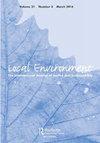Language, context, and action: exploring equity and justice content in Vancouver environmental plans
IF 2.8
3区 环境科学与生态学
Q3 ENVIRONMENTAL STUDIES
引用次数: 0
Abstract
ABSTRACT Environmental plans have been criticised for failing to appropriately address equity and justice concerns, exacerbating inequity, and overlooking systemic injustices. Some scholars have argued that the use of equity and justice terminology impacts the equity and justice work being done, citing challenges with vague uses of equity. Our research used thematic content analyses, with a focus on language-use, to explore equity and justice framings in four environmental planning documents in Vancouver, B.C. Framings of equity and justice were coded across nine dominant themes and compared against how often each plan acknowledged and addressed four dimensions of justice: distributive, procedural, recognition, and epistemic. We found that plans with more specific, nuanced, and seemingly intentional framings of equity and justice generally included more well-rounded engagement with the four dimensions of justice. Between documents, we highlight vague uses of equity, a focus on distribution, and equity being framed primarily as a guaranteed byproduct. Across documents, we highlight benefits-for-all language, different responses to systemic injustice, and different planning contexts. In discussing the contextual differences across plans, we argue it is important for more research to consider equity and justice in planning on a micro level to better understand the specific justice needs and limitations of different cities and planning goals. We also argue for more work to include epistemic justice alongside the traditional distributive, procedural, and recognition justices. Key policy highlights To better support equity and justice work, planners should aim to have a clear and specific understanding of a project’s equity and justice concerns, priorities, and goals early in the planning process; equity and justice priorities and approaches should guide the entire planning process, rather than be incorporated into a finished product after-the-fact. To better support equity and justice work, approaches to equity and justice in plans should be grounded in a detailed and nuanced understanding of systemic injustices and intersectionality. Generalised, “benefits-for-all” language could risk inequitable solutions; whenever possible, plans should identify specific groups and their unique needs. To better consider local needs and address equity and justice issues, plans should acknowledge and incorporate diverse knowledge systems, perspectives, and practices such as Indigenous ways of “doing, being, and knowing”.语言,语境和行动:探索温哥华环境计划中的公平和正义内容
环境计划因未能适当解决公平和正义问题而受到批评,加剧了不平等,并忽视了系统性的不公正。一些学者认为,公平和司法术语的使用影响了正在进行的公平和司法工作,并引用了公平使用模糊的挑战。我们的研究使用主题内容分析,重点关注语言使用,探索不列颠哥伦比亚省温哥华四个环境规划文件中的公平和正义框架。公平和正义框架被编码为九个主要主题,并与每个计划承认和解决四个正义维度的频率进行比较:分配、程序、识别和认知。我们发现,对公平和正义有更具体、更细致、似乎更有意的框架的计划,通常包括更全面地参与正义的四个维度。在文件之间,我们强调了对公平的模糊使用、对分配的关注以及将公平主要视为一种有保证的副产品。在所有文件中,我们强调了“人人受益”的语言、对系统性不公正的不同反应以及不同的规划背景。在讨论规划的背景差异时,我们认为有必要开展更多的研究,从微观层面考虑规划中的公平和正义,以更好地了解不同城市和规划目标的具体正义需求和局限性。我们还认为,除了传统的分配正义、程序正义和承认正义之外,还需要更多的工作来包括认知正义。为了更好地支持公平和正义工作,规划者应力求在规划过程的早期就对项目的公平和正义问题、优先事项和目标有一个清晰和具体的了解;公平和正义的优先事项和方法应指导整个规划过程,而不是事后纳入成品。为了更好地支持公平和司法工作,计划中的公平和司法方法应以对系统性不公正和相互关联的详细和细致的理解为基础。泛化的“人人受益”的语言可能会带来不公平的解决方案;只要有可能,计划应该确定特定的群体及其独特的需求。为了更好地考虑当地需求并解决公平和正义问题,计划应承认并纳入各种知识体系、观点和实践,例如土著“做、存在和认识”的方式。
本文章由计算机程序翻译,如有差异,请以英文原文为准。
求助全文
约1分钟内获得全文
求助全文
来源期刊

Local Environment
Environmental Science-Management, Monitoring, Policy and Law
CiteScore
4.10
自引率
4.20%
发文量
88
期刊介绍:
Local Environment: The International Journal of Justice and Sustainability is a refereed journal written by and for researchers, activists, non-governmental organisations, students, teachers, policy makers and practitioners. Our focus is specifically on sustainability planning, policy and politics in relation to theoretical, conceptual and empirical studies at the nexus of equity, justice and the local environment. It is an inclusive forum for diverse constituencies and perspectives to engage in a critical examination, evaluation and discussion of the environmental, social and economic policies, processes and strategies which will be needed in movement towards social justice and sustainability - "Just Sustainabilities" - at local, regional, national and global scales.
Please note that we only accept submissions that share our focus. Based on critical research and practical experience, we are particularly seeking submissions from nations and continents representing different levels of income and industrial development and from countries in transition in order to engage in mutual learning and understanding.
 求助内容:
求助内容: 应助结果提醒方式:
应助结果提醒方式:


